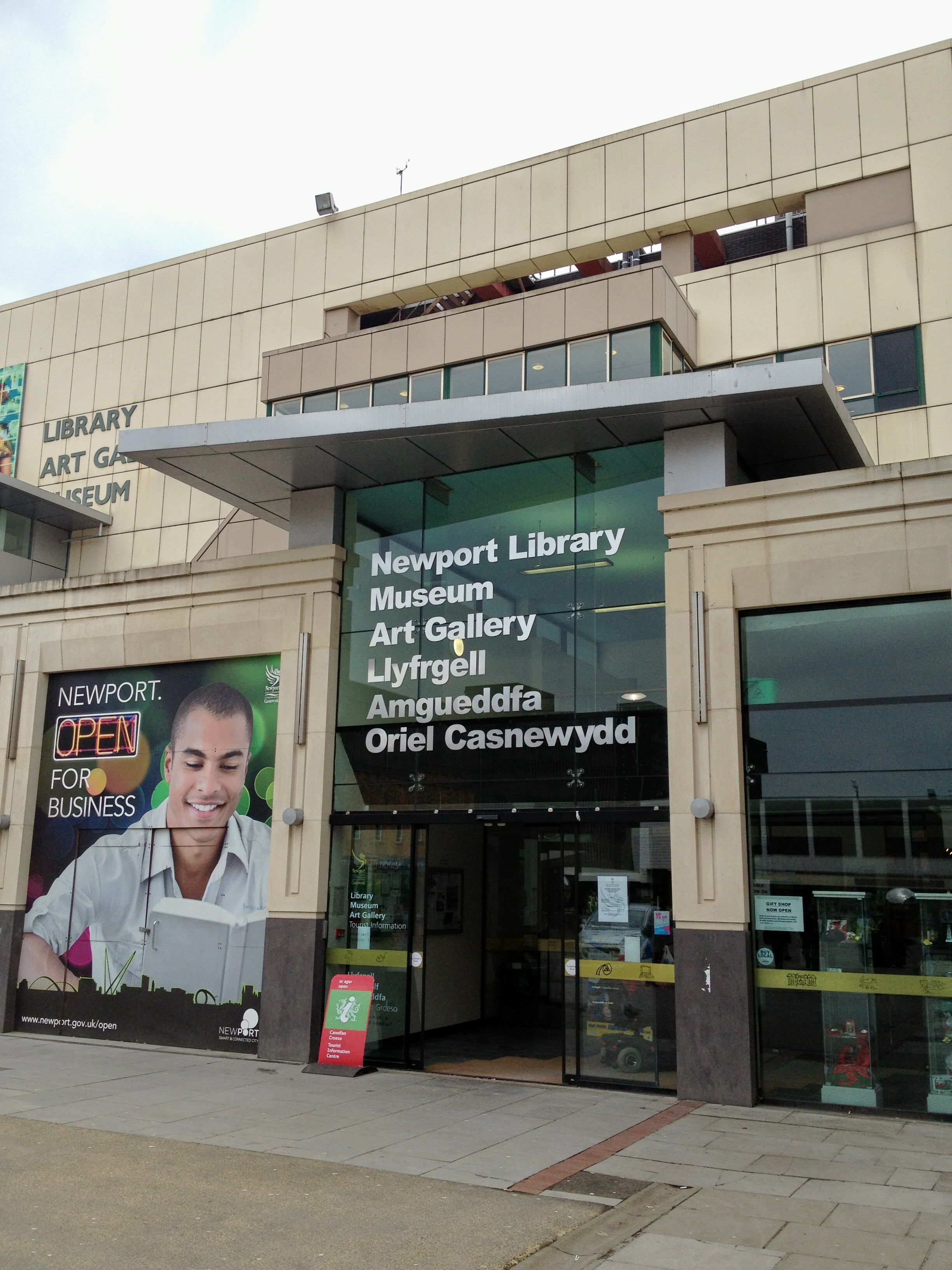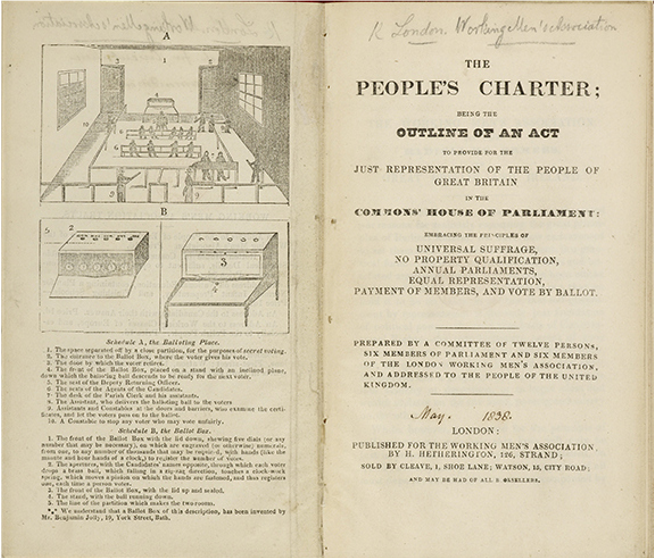
Chartism was a national campaign formed into many local branch “lodges” most active between 1836 and 1848 in support of The People’s Charter which proposed Six Points to gain better voting rights and representation in Parliament and therefore greater influence for the working classes.
Early in the reign of Queen Victoria, many ordinary people were angry at the social and industrial injustices they faced so they attended meetings and rallies held throughout the country, signing a petition to Parliament in support of The People’s Charter. Presented as a popular-style Magna Carta, the Charter rapidly gained support across the country and its supporters became known as Chartists. The Charter was launched in Glasgow in May 1838, at a meeting attended by an estimated 150,000 people.
A petition containing 1,280,958 signatures in support of the Charter, signed at Chartist meetings across Britain, was brought to London in May 1839 and presented to Parliament, but MP’s refused to consider it.
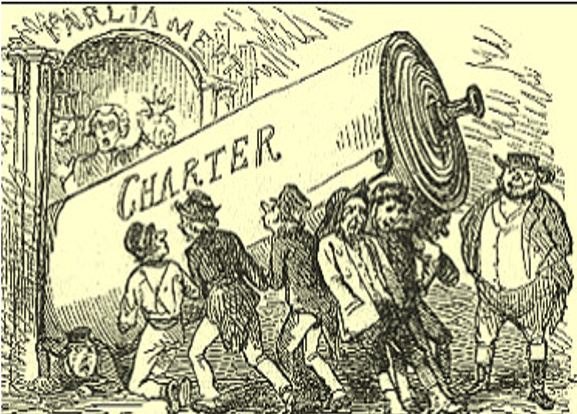
This cartoon of the day sums up feelings of the Chartists at the rejection of petition supporting the People’s Charter.
In South Wales many people attended Chartist meetings held in many local pubs and meeting halls where local leaders including Zephaniah Williams in the Nantyglo area, William Jones in Pontypool and John Frost in Newport persuaded their fellow Chartists to sign the Charter petition.
Henry Vincent, a charismatic young Chartist, was sent to tour South Wales and the West of England where he and John Frost gave rousing speeches in places like Star Fields, Dukestown, and Pentonville Fields, Newport, promoting the People’s Charter to give working people better representation in Parliament, and condemning the injustices of the day including widespread poverty, unfair taxation and political corruption.
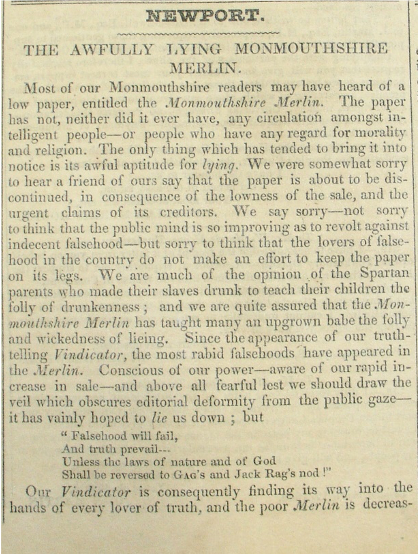
Henry Vincent also published a Chartist newspaper, “The Western Vindicator” to promote Chartist ideas, and in one edition the female Chartists of Newport wrote this: “We seek for equality of rights and these will not be secured to the people until the Charter, the People’s Charter, becomes the law of the land.” (Western Vindicator, July 15th 1839). Vincent’s ideas expressed in The Western Vindicator often challenged stories published in rival establishment newspapers, particularly The Monmouthshire Merlin.
The rejection of the People’s Charter by Parliament caused great resentment and encouraged the South Wales Chartists to consider taking some form of direct action. Zephaniah Williams and John Rees from Dukestown were among the Chartist leaders proposing “physical force” while other like Henry Vincent and John Frost supported “moral force”.
But eventually Frost was persuaded to lead the South Wales Chartists in a march on Newport, so, on a bleak November night in 1839, an angry yet determined crowd of more than 5,000 Chartists led by Zephaniah Williams from Tredegar, William Jones from Pontpool and their leader John Frost, set off from all over the Gwent valleys to march on Newport and the Westgate Inn, an event which we now call the Newport Rising. One of their aims that day was to set free the Chartist prisoners held by the authorities inside the Westgate.
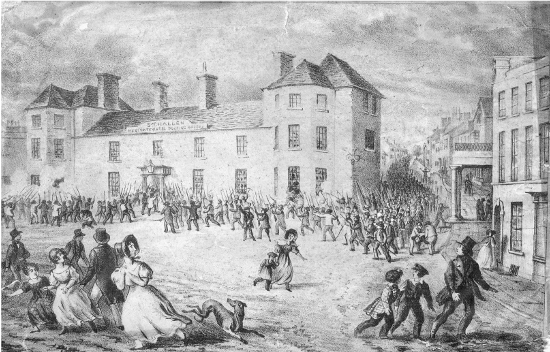
The Chartists marched all through a cold and stormy Sunday night, arriving in Newport early on Monday 4th November 1839, with John Frost at their head, to march down Stow Hill towards the Westgate Inn which they then tried to enter. But the Mayor, Thomas Phillips, with about 30 soldiers, was already inside waiting for the Chartists to arrive. A shot rang out and the soldiers flung open the shutters of the windows behind which they had been hiding and fired on the Chartists. 20 minutes later when the order to cease fire had been given, 22 Chartists lay dead in the street, including 18 year-old Pontypool Chartist, George Shell. The crowd fled in disarray and later John Frost, Zephaniah Williams and William Jones were arrested, put on trial for High Treason, found guilty and transported to a penal colony in Australia.
However, thanks to the passion, determination and the sacrifices made by the Chartists who took part in the Newport Rising, our democratic rights are now continuing to evolve. Slowly, over the years, the People’s Charter has shaped the law of our land so all adults now have the responsibility and the privilege of voting rights, so ensuring that our country is fairer and safer for all citizens.




